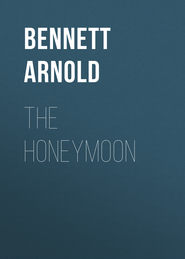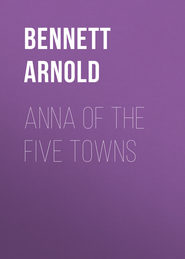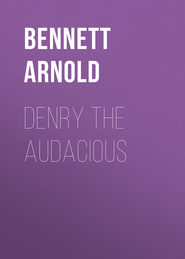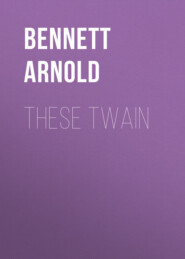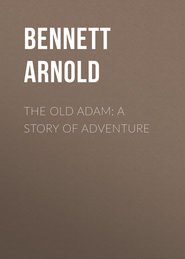По всем вопросам обращайтесь на: info@litportal.ru
(©) 2003-2024.
✖
A Great Man: A Frolic
Настройки чтения
Размер шрифта
Высота строк
Поля
And yet, on this particular evening when Sarah had been instructed to put a hot-water bottle in his bed, Henry's tone, in greeting his aunt, had been curt, fretful, peevish, nearly cantankerous. 'Don't worry me!' he had irascibly protested, well knowing that his good aunt was guiltless of the slightest intention to worry him. Here was a problem, an apparent contradiction, in Henry's personality.
His aunt, in the passage, and his mother, who had overheard in the dining-room, instantly and correctly solved the problem by saying to themselves that Henry's tone was a Symptom. They had both been collecting symptoms for four days. His mother had first discovered that he had a cold; Aunt Annie went further and found that it was a feverish cold. Aunt Annie saw that his eyes were running; his mother wormed out of him that his throat tickled and his mouth was sore. When Aunt Annie asked him if his eyes ached as well as ran, he could not deny it. On the third day, at breakfast, he shivered, and the two ladies perceived simultaneously the existence of a peculiar rash behind Henry's ears. On the morning of the fourth day Aunt Annie, up early, scored one over her sister by noticing the same rash at the roots of his still curly hair. It was the second rash, together with Henry's emphatic and positive statement that he was perfectly well, which had finally urged his relatives to a desperate step – a step involving intrigue and prevarication. And to justify this step had come the crowning symptom of peevishness – peevishness in Henry! It wanted only that!
'I've asked Dr. Dancer to call in to-night,' said Aunt Annie casually, while Henry was assuming his toasted crimson carpet slippers. Mrs. Knight was brewing tea in the kitchen.
'What for?' Henry demanded quickly, and as if defensively. Then he added: 'Is mother wrong again?'
Mrs. Knight had a recurrent 'complaint.'
'Well,' said Aunt Annie darkly, 'I thought it would be as well to be on the safe side…'
'Certainly,' said Henry.
This was Aunt Annie's neat contribution to the necessary prevarication.
They had tea and ham-and-eggs, the latter specially chosen because it was a dish that Henry doted upon. However, he ate but little.
'You're overtired, dear,' his mother ventured.
'Overtired or not, mater,' said Henry with a touch of irony, 'I must do some work to-night. Sir George has asked me to – '
'My dear love,' Mrs. Knight cried out, moved, 'you've no right – '
But Aunt Annie quelled the impulsive creature with a glance full of meaning. 'Sir George what?' she asked, politely interested.
'The governor has asked me to look through his Christmas appeal for the Clerks' Society, and to suggest any alterations that occur to me.'
It became apparent to the ladies, for the thousand and first time, that Sir George would be helpless without Henry, utterly helpless.
After tea the table was cleared, and Henry opened his bag and rustled papers, and the ladies knitted and sewed with extraordinary precautions to maintain the silence which was the necessary environment of Henry's labours. And in the calm and sane domestic interior, under the mild ray of the evening lamp, the sole sounds were Henry's dry, hacking cough and the cornet-like blasts of his nose into his cambric handkerchief.
'I think I'll do no more to-night,' he said at length, yawning.
'That's right, dear,' his mother ejaculated.
Then the doctor entered, and, for all the world as if by preconcerted action, the ladies disappeared. Dr. Dancer was on friendly terms with the household, and, his age being thirty, he was neither too old nor too young to address Henry as Old Man.
'Hallo, old man,' he began, after staring hard at Henry. 'What's the matter with your forehead?'
'Forehead?' Henry repeated questioningly.
'Yes. Let's have a look.'
The examination was thorough, and it ended with the thrusting of a thermometer into Henry's unwilling mouth.
'One hundred and two,' said the doctor, and, smiling faintly, he whispered something to Henry.
'You're joking,' Henry replied, aghast.
'No, I'm not. Of course it's not serious. But it means bed for a fortnight or so, and you must go immediately.'
The ladies, who had obviously and shamelessly been doing that which they so strongly deprecated in Sarah, came back into the room.
In half an hour Henry was in bed, and a kettle containing eucalyptus was steaming over a bright fire in the bedroom; and his mother was bent upon black-currant tea in the kitchen; and Aunt Annie was taking down from dictation, in her angular Italian hand, a letter which began: 'Dear Sir George, – I much regret to say'; and little Sarah was standing hooded and girt up, ready to fly upon errands of the highest importance at a second's notice.
'Sarah,' said Mrs. Knight solemnly, when Sarah had returned from the post and the doctor's, 'I am going to trust you. Your master has got the measles, but, of course, we don't want anyone to know, so you mustn't breathe a word.'
'No'm,' said Sarah.
'He never had them as a boy,' Mrs. Knight added proudly.
'Didn't he, mum?' said Sarah.
The doctor, whose gift for seriousness was not marked, showed a tendency to see humour in the situation of Sir George's private secretary being down with measles. But he was soon compelled to perceive his mistake. By a united and tremendous effort Mrs. Knight and Aunt Annie made measles august. As for Sarah, she let slip the truth to the milkman. It came out by itself, as the spout of a teapot had once come off by itself in her hand.
The accident policy appeared to provide for every emergency except measles.
CHAPTER VIII
CREATIVE
The sick-room – all due solemnity and importance must be imported into the significance of that word – the sick-room became a shrine, served by two ageing priestesses and a naïve acolyte. Everything was done to make Henry an invalid in the grand manner. His bed of agony became the pivot on which the household life flutteringly and soothingly revolved. No detail of delicate attention which the most ingenious assiduity could devise was omitted from the course of treatment. And if the chamber had been at the front instead of at the back, the Fulham Vestry would certainly have received an application for permission to lay down straw in the street.
The sole flaw in the melancholy beauty of the episode was that Henry was never once within ten miles of being seriously ill. He was incapable of being seriously ill. He happened to be one of those individuals who, when they 'take' a disease, seem to touch it only with the tips of their fingers: such was his constitution. He had the measles, admittedly. His temperature rose one night to a hundred and three, and for a few brief moments his mother and Aunt Annie enjoyed visions of fighting the grim spectre of Death. The tiny round pink spots covered his face and then ran together into a general vermilion. He coughed exquisitely. His beard grew. He supported life on black-currant tea and an atmosphere impregnated with eucalyptus. He underwent the examination of the doctor every day at eleven. But he was not personally and genuinely ill. He did not feel ill, and he said so. His most disquieting symptom was boredom. This energetic organism chafed under the bed-clothes and the black-currant tea and the hushed eucalyptic calm of the chamber. He fervently desired to be up and active and stressful. His mother and aunt cogitated in vain to hit on some method of allaying the itch for work. And then one day – it was the day before Christmas – his mother chanced to say:
'You might try to write out that story you told us about – when you are a little stronger. It would be something for you to do.'
Henry shook his head sheepishly.
'Oh no!' he said; 'I was only joking.'
'I'm sure you could write it quite nicely,' his mother insisted.
And Henry shook his head again, and coughed. 'No,' he said. 'I hope I shall have something better to do than write stories.'
'But just to pass the time!' pleaded Aunt Annie.
The fact was that, several weeks before, while his thoughts had been engaged in analyzing the detrimental qualities of the Stream of Trashy Novels Constantly Poured Forth by the Press, Henry had himself been visited by a notion for a story. He had scornfully ejected it as an inopportune intruder; but it had returned, and at length, to get rid for ever of this troublesome guest, he had instinctively related the outline of the tale over the tea-table. And the outline had been pronounced wonderful. 'It might be called Love in Babylon– Babylon being London, you know,' he had said. And Aunt Annie had exclaimed: 'What a pretty title!' Whereupon Henry had remarked contemptuously and dismissingly: 'Oh, it was just an idea I had, that's all!' And the secret thought of both ladies had been, 'That busy brain is never still.'
As the shades of Christmas Eve began to fall, Aunt Annie was seated by the sick-bed, engaged in making entries in the household washing-book with a lead pencil. Henry lay with his eyes closed. Mrs. Knight was out shopping. Presently there was a gentle ting of the front-door bell; then a protracted silence; then another gentle ting.
'Bless the girl! Why doesn't she answer the door?' Aunt Annie whispered to herself, listening hard.
A third time the bell rang, and Aunt Annie, anathematizing the whole race of servants, got up, put the washing-book on the dressing-table, lighted the gas and turned it low, and descended to answer the door in person and to behead Sarah.
More than an hour elapsed before either sister re-entered Henry's room – events on the ground-floor had been rather exciting – and then they appeared together, bearing a bird, and some mince-tarts on a plate, and a card. Henry was wide awake.
'This is a surprise, dear,' began Mrs. Knight. 'Just listen: "With Sir George Powell's hearty greetings and best wishes for a speedy recovery!" A turkey and six mince-tarts. Isn't it thoughtful of him?'
His aunt, in the passage, and his mother, who had overheard in the dining-room, instantly and correctly solved the problem by saying to themselves that Henry's tone was a Symptom. They had both been collecting symptoms for four days. His mother had first discovered that he had a cold; Aunt Annie went further and found that it was a feverish cold. Aunt Annie saw that his eyes were running; his mother wormed out of him that his throat tickled and his mouth was sore. When Aunt Annie asked him if his eyes ached as well as ran, he could not deny it. On the third day, at breakfast, he shivered, and the two ladies perceived simultaneously the existence of a peculiar rash behind Henry's ears. On the morning of the fourth day Aunt Annie, up early, scored one over her sister by noticing the same rash at the roots of his still curly hair. It was the second rash, together with Henry's emphatic and positive statement that he was perfectly well, which had finally urged his relatives to a desperate step – a step involving intrigue and prevarication. And to justify this step had come the crowning symptom of peevishness – peevishness in Henry! It wanted only that!
'I've asked Dr. Dancer to call in to-night,' said Aunt Annie casually, while Henry was assuming his toasted crimson carpet slippers. Mrs. Knight was brewing tea in the kitchen.
'What for?' Henry demanded quickly, and as if defensively. Then he added: 'Is mother wrong again?'
Mrs. Knight had a recurrent 'complaint.'
'Well,' said Aunt Annie darkly, 'I thought it would be as well to be on the safe side…'
'Certainly,' said Henry.
This was Aunt Annie's neat contribution to the necessary prevarication.
They had tea and ham-and-eggs, the latter specially chosen because it was a dish that Henry doted upon. However, he ate but little.
'You're overtired, dear,' his mother ventured.
'Overtired or not, mater,' said Henry with a touch of irony, 'I must do some work to-night. Sir George has asked me to – '
'My dear love,' Mrs. Knight cried out, moved, 'you've no right – '
But Aunt Annie quelled the impulsive creature with a glance full of meaning. 'Sir George what?' she asked, politely interested.
'The governor has asked me to look through his Christmas appeal for the Clerks' Society, and to suggest any alterations that occur to me.'
It became apparent to the ladies, for the thousand and first time, that Sir George would be helpless without Henry, utterly helpless.
After tea the table was cleared, and Henry opened his bag and rustled papers, and the ladies knitted and sewed with extraordinary precautions to maintain the silence which was the necessary environment of Henry's labours. And in the calm and sane domestic interior, under the mild ray of the evening lamp, the sole sounds were Henry's dry, hacking cough and the cornet-like blasts of his nose into his cambric handkerchief.
'I think I'll do no more to-night,' he said at length, yawning.
'That's right, dear,' his mother ejaculated.
Then the doctor entered, and, for all the world as if by preconcerted action, the ladies disappeared. Dr. Dancer was on friendly terms with the household, and, his age being thirty, he was neither too old nor too young to address Henry as Old Man.
'Hallo, old man,' he began, after staring hard at Henry. 'What's the matter with your forehead?'
'Forehead?' Henry repeated questioningly.
'Yes. Let's have a look.'
The examination was thorough, and it ended with the thrusting of a thermometer into Henry's unwilling mouth.
'One hundred and two,' said the doctor, and, smiling faintly, he whispered something to Henry.
'You're joking,' Henry replied, aghast.
'No, I'm not. Of course it's not serious. But it means bed for a fortnight or so, and you must go immediately.'
The ladies, who had obviously and shamelessly been doing that which they so strongly deprecated in Sarah, came back into the room.
In half an hour Henry was in bed, and a kettle containing eucalyptus was steaming over a bright fire in the bedroom; and his mother was bent upon black-currant tea in the kitchen; and Aunt Annie was taking down from dictation, in her angular Italian hand, a letter which began: 'Dear Sir George, – I much regret to say'; and little Sarah was standing hooded and girt up, ready to fly upon errands of the highest importance at a second's notice.
'Sarah,' said Mrs. Knight solemnly, when Sarah had returned from the post and the doctor's, 'I am going to trust you. Your master has got the measles, but, of course, we don't want anyone to know, so you mustn't breathe a word.'
'No'm,' said Sarah.
'He never had them as a boy,' Mrs. Knight added proudly.
'Didn't he, mum?' said Sarah.
The doctor, whose gift for seriousness was not marked, showed a tendency to see humour in the situation of Sir George's private secretary being down with measles. But he was soon compelled to perceive his mistake. By a united and tremendous effort Mrs. Knight and Aunt Annie made measles august. As for Sarah, she let slip the truth to the milkman. It came out by itself, as the spout of a teapot had once come off by itself in her hand.
The accident policy appeared to provide for every emergency except measles.
CHAPTER VIII
CREATIVE
The sick-room – all due solemnity and importance must be imported into the significance of that word – the sick-room became a shrine, served by two ageing priestesses and a naïve acolyte. Everything was done to make Henry an invalid in the grand manner. His bed of agony became the pivot on which the household life flutteringly and soothingly revolved. No detail of delicate attention which the most ingenious assiduity could devise was omitted from the course of treatment. And if the chamber had been at the front instead of at the back, the Fulham Vestry would certainly have received an application for permission to lay down straw in the street.
The sole flaw in the melancholy beauty of the episode was that Henry was never once within ten miles of being seriously ill. He was incapable of being seriously ill. He happened to be one of those individuals who, when they 'take' a disease, seem to touch it only with the tips of their fingers: such was his constitution. He had the measles, admittedly. His temperature rose one night to a hundred and three, and for a few brief moments his mother and Aunt Annie enjoyed visions of fighting the grim spectre of Death. The tiny round pink spots covered his face and then ran together into a general vermilion. He coughed exquisitely. His beard grew. He supported life on black-currant tea and an atmosphere impregnated with eucalyptus. He underwent the examination of the doctor every day at eleven. But he was not personally and genuinely ill. He did not feel ill, and he said so. His most disquieting symptom was boredom. This energetic organism chafed under the bed-clothes and the black-currant tea and the hushed eucalyptic calm of the chamber. He fervently desired to be up and active and stressful. His mother and aunt cogitated in vain to hit on some method of allaying the itch for work. And then one day – it was the day before Christmas – his mother chanced to say:
'You might try to write out that story you told us about – when you are a little stronger. It would be something for you to do.'
Henry shook his head sheepishly.
'Oh no!' he said; 'I was only joking.'
'I'm sure you could write it quite nicely,' his mother insisted.
And Henry shook his head again, and coughed. 'No,' he said. 'I hope I shall have something better to do than write stories.'
'But just to pass the time!' pleaded Aunt Annie.
The fact was that, several weeks before, while his thoughts had been engaged in analyzing the detrimental qualities of the Stream of Trashy Novels Constantly Poured Forth by the Press, Henry had himself been visited by a notion for a story. He had scornfully ejected it as an inopportune intruder; but it had returned, and at length, to get rid for ever of this troublesome guest, he had instinctively related the outline of the tale over the tea-table. And the outline had been pronounced wonderful. 'It might be called Love in Babylon– Babylon being London, you know,' he had said. And Aunt Annie had exclaimed: 'What a pretty title!' Whereupon Henry had remarked contemptuously and dismissingly: 'Oh, it was just an idea I had, that's all!' And the secret thought of both ladies had been, 'That busy brain is never still.'
As the shades of Christmas Eve began to fall, Aunt Annie was seated by the sick-bed, engaged in making entries in the household washing-book with a lead pencil. Henry lay with his eyes closed. Mrs. Knight was out shopping. Presently there was a gentle ting of the front-door bell; then a protracted silence; then another gentle ting.
'Bless the girl! Why doesn't she answer the door?' Aunt Annie whispered to herself, listening hard.
A third time the bell rang, and Aunt Annie, anathematizing the whole race of servants, got up, put the washing-book on the dressing-table, lighted the gas and turned it low, and descended to answer the door in person and to behead Sarah.
More than an hour elapsed before either sister re-entered Henry's room – events on the ground-floor had been rather exciting – and then they appeared together, bearing a bird, and some mince-tarts on a plate, and a card. Henry was wide awake.
'This is a surprise, dear,' began Mrs. Knight. 'Just listen: "With Sir George Powell's hearty greetings and best wishes for a speedy recovery!" A turkey and six mince-tarts. Isn't it thoughtful of him?'






